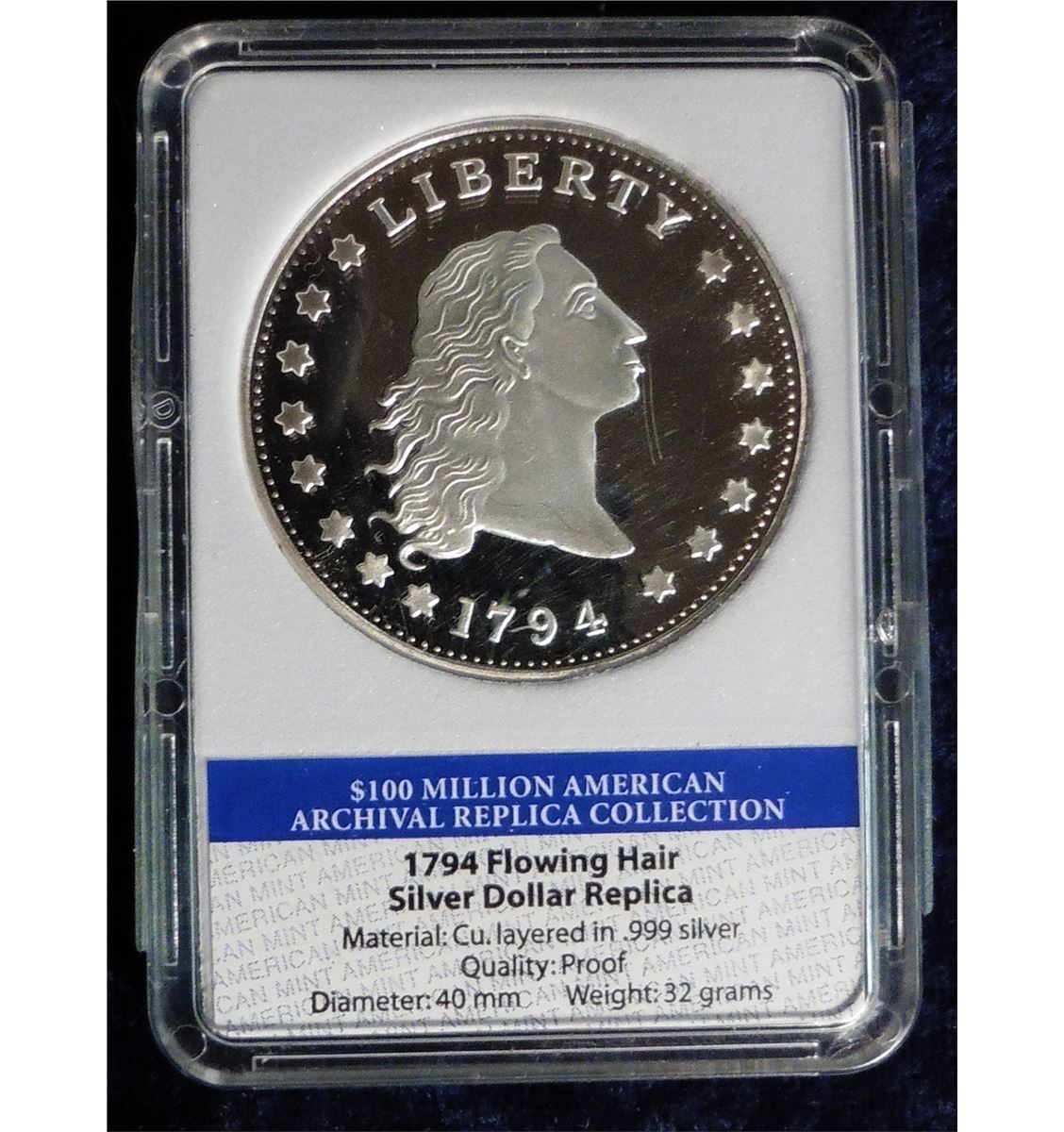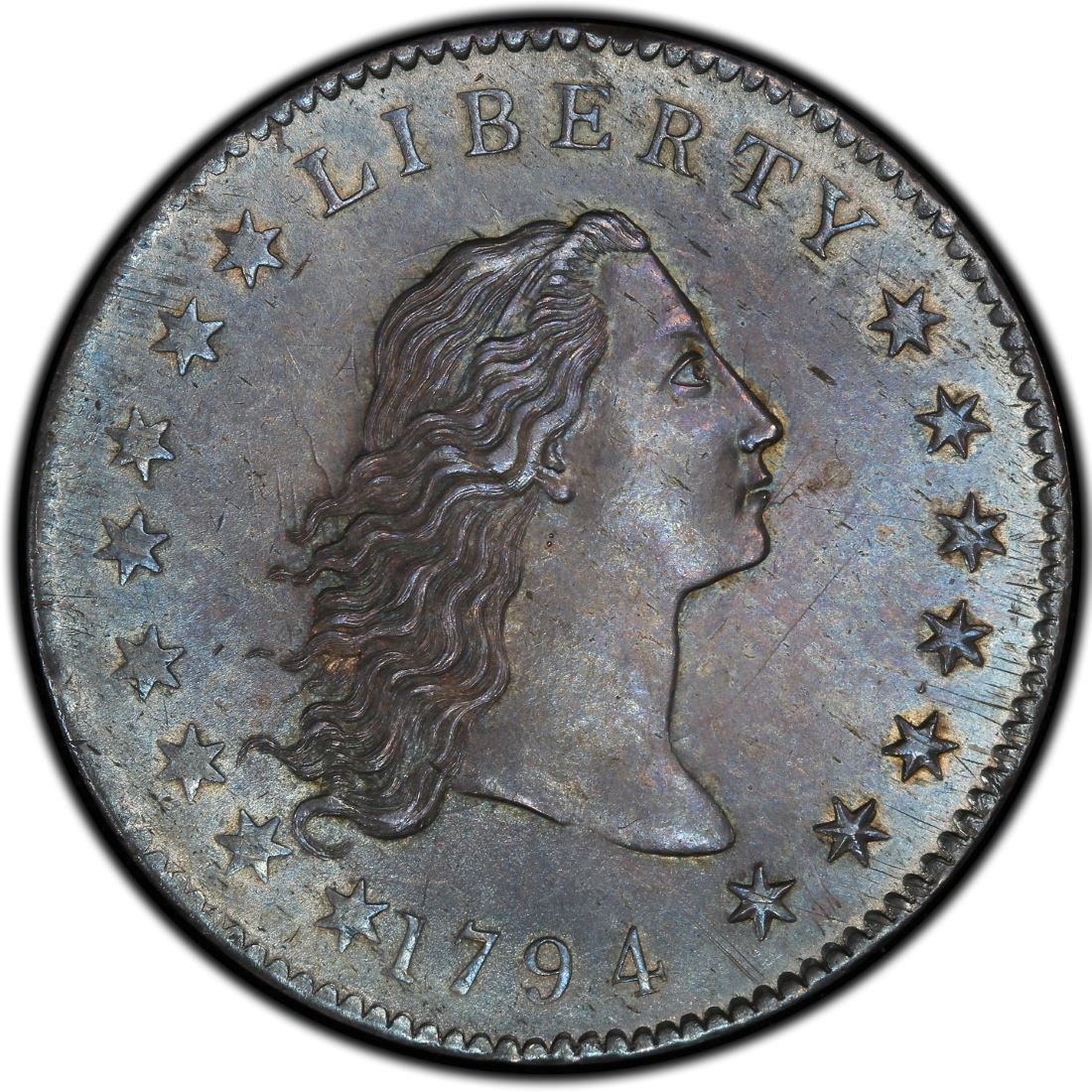The Flowing Hair Dollar represents the very first silver dollar and the largest silver denomination minted in the United States. The coins were produced for just two years from 1794 to 1795 at the Philadelphia Mint. The 1794 is a famous rarity and one of the keys to a complete set of silver dollars, while the 1795 relatively more available. Uncirculated examples for both dates are rare. This short series is often collected alongside other pre-1804 silver dollars.
After the silver dollar denomination was authorized by the Coinage Act of 1792, it would take two full years for the first silver coins to be struck. The delay was the result of various factors. There was no building suitable for such work in Philadelphia, where the new Mint was to be located. Additionally, bullion was in short supply. Eventually, a deposit of minor French silver coins of varying alloys and fineness would be used to produce the first silver dollars.


The Flowing Hair Dollar was designed by Robert Scot, who had previously designed some of the copper coins first issued in 1793 and 1794. The obverse featured a head of Liberty, facing right with large locks of flowing hair behind her. Above the image is the word LIBERTY in capital letters. Eight stars are positioned to the left and seven stars are to the right, together representing the fifteen states in the Union at the time the pieces were struck.
Coin Value Price Chart for Flowing Hair Half Dollars 50C. Lookup Coin values for Good, Very Good, Fine, Very Fine, Brilliant Uncirculated & Proof conditions and MS grade. How much Flowing Hair Half Dollars are worth. Coins for sale for Flowing Hair type Half Dollars items. The above is an image of a counterfeit 1794 Flowing Hair Silver Dollar, Small Eagle Reverse, and this coin looks too good to be authentic. The details of the hair is to pronounced and the eagle's breast feathers are the incorrect shape, and the relief in general is too high (meaning that this coin is struck in high relief and no Flowing Hair Dollars were struck in high relief). Today we are featuring the cream of the crop of all early US dollars. The famous 1794 PCGS SP66. Currently on display at the Long Beach Coin Expo. Flowing Hair (1794-1795) The dollar was the cornerstone of the monetary system devised by the Founding Fathers for the fledgling United States. More than two years passed, however, between the time Congress authorized dollar coinage and the actual production of.
The reverse features a bald eagle with its wings perched, fully surrounded by a wreath. The widely spaced inscription UNITED STATES OF AMERICA surrounds the image. As on all the other early silver and gold coins, no denomination is indicated on the surfaces of the coin. Instead, the denomination is lettered on the edge of the coin reading HUNDRED CENTS ONE DOLLAR OR UNIT. The last word was specified in the Coinage Act of 1792, where the denomination was referred to as Dollar or Unit.
The first silver coinage planned for production had initially been the half dime denomination. However, Mint director David Rittenhouse decided that the nation's first silver coinage would have to be the silver dollar, as it was the cornerstone of the American monetary system. A quantity of 2,000 silver dollars were struck at the small coining press available at the Philadelphia Mint . Of this amount, only 1,758 coins would be distributed to VIP's, Congressmen, and eventually circulation. The remaining 242 pieces were melted soon after their mintage for lack of quality.
Flowing Hair Dollar Coin
Originality is extremely important when grading Flowing Hair Dollars. Over the centuries, many of the surviving pieces have been cleaned, damaged, or repaired. Original pieces are scarce, and worth considerably more than the typical coins that appear on the market. Weakness in strike can be a common problem, and a sharply struck coin is a rarity, especially for the first date. The large sized coins were also extremely vulnerable to marks, and many circulated and uncirculated pieces show heavy contact marks in the fields. Uncirculated pieces which exhibit prooflike fields are a true pleasure to behold, if it is possible to locate one of the rare examples that escaped circulation and survived through the centuries.

